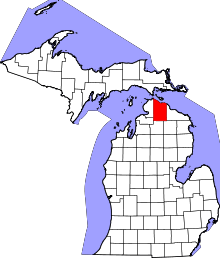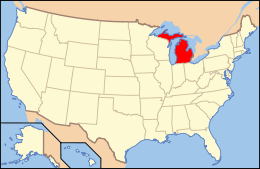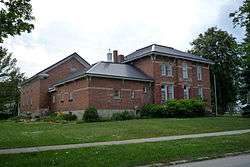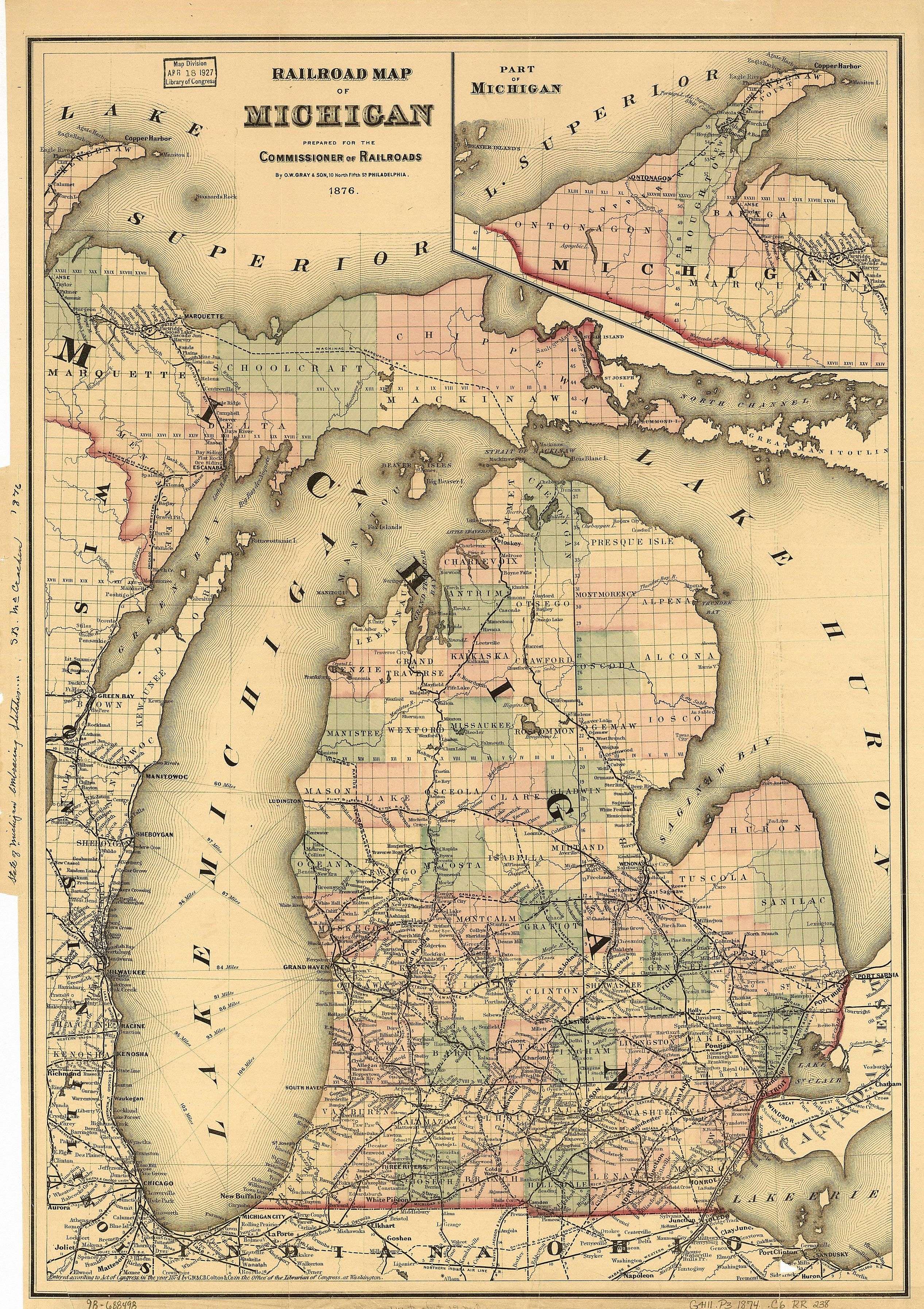Cheboygan County, Michigan
| Cheboygan County, Michigan | ||
|---|---|---|
| ||
 Location in the U.S. state of Michigan | ||
 Michigan's location in the U.S. | ||
| Founded | 1840[1] | |
| Seat | Cheboygan | |
| Largest city | Cheboygan | |
| Area | ||
| • Total | 885 sq mi (2,292 km2) | |
| • Land | 715 sq mi (1,852 km2) | |
| • Water | 170 sq mi (440 km2), 19% | |
| Population | ||
| • (2010) | 26,512 | |
| • Density | 37/sq mi (14/km²) | |
| Congressional district | 1st | |
| Time zone | Eastern: UTC-5/-4 | |
| Website |
www | |
Cheboygan County is a county in the U.S. state of Michigan. As of the 2010 census, the population was 26,152.[2] The county seat is Cheboygan.[3] The county boundaries were set off in 1840 and county government organized in 1853.[1]
Etymology of the name Cheboygan
The name of the county shares the same origin as that of the Cheboygan River, although the precise meaning is no longer known. It may have come from an Ojibwe word zhaabonigan, meaning "sewing needle". Alternatively, the origin may have been Chabwegan, meaning "a place of ore".[4] It has also been described as "a Native American word first applied to the river.[1] See List of Michigan county name etymologies.
Geography
According to the U.S. Census Bureau, the county has a total area of 885 square miles (2,290 km2), of which 715 square miles (1,850 km2) is land and 170 square miles (440 km2) (19%) is water.[5] The county is considered to be part of Northern Michigan.
This 1876 map shows Cheboygan County between Emmet County and Presque Isle County.
Adjacent counties
- Mackinac County - north
- Presque Isle County - east
- Montmorency County - southeast
- Otsego County - south
- Charlevoix County - southwest
- Emmet County - west
Transportation
Highways
Cheboygan County-designated highways
Airports
- Cheboygan County Airport, located in Cheboygan, is a private airport. There are no commercial airline airports in Cheboygan County but the nearest ones are Alpena County Regional Airport, Chippewa County International Airport (Sault Ste. Marie, MI), and Cherry Capital Airport (Traverse City). Delta Air Lines schedules flights daily out of the Pellston Regional Airport.
Demographics
| Historical population | |||
|---|---|---|---|
| Census | Pop. | %± | |
| 1860 | 517 | — | |
| 1870 | 2,196 | 324.8% | |
| 1880 | 6,524 | 197.1% | |
| 1890 | 11,986 | 83.7% | |
| 1900 | 15,516 | 29.5% | |
| 1910 | 17,872 | 15.2% | |
| 1920 | 13,991 | −21.7% | |
| 1930 | 11,502 | −17.8% | |
| 1940 | 13,644 | 18.6% | |
| 1950 | 13,731 | 0.6% | |
| 1960 | 14,550 | 6.0% | |
| 1970 | 16,573 | 13.9% | |
| 1980 | 20,649 | 24.6% | |
| 1990 | 21,398 | 3.6% | |
| 2000 | 26,448 | 23.6% | |
| 2010 | 26,152 | −1.1% | |
| Est. 2015 | 25,427 | [6] | −2.8% |
| U.S. Decennial Census[7] 1790-1960[8] 1900-1990[9] 1990-2000[10] 2010-2013[2] | |||
As of the census[11] of 2000, there were 26,448 people, 10,835 households, and 7,573 families residing in the county. The population density was 37 people per square mile (14/km²). There were 16,583 housing units at an average density of 23 per square mile (9/km²). The racial makeup of the county was 94.80% White, 0.25% Black or African American, 2.55% Native American, 0.20% Asian, 0.02% Pacific Islander, 0.15% from other races, and 2.05% from two or more races. 0.76% of the population were Hispanic or Latino of any race. 21.4% were of German, 10.4% English, 10.0% French, 9.5% Polish, 9.2% American and 8.9% Irish ancestry according to Census 2000. 97.7% spoke English as their first language.
There were 10,835 households out of which 28.60% had children under the age of 18 living with them, 58.00% were married couples living together, 8.60% had a female householder with no husband present, and 30.10% were non-families. 25.80% of all households were made up of individuals and 11.80% had someone living alone who was 65 years of age or older. The average household size was 2.41 and the average family size was 2.87.
In the county the population was spread out with 23.70% under the age of 18, 6.20% from 18 to 24, 25.80% from 25 to 44, 26.30% from 45 to 64, and 17.90% who were 65 years of age or older. The median age was 41 years. For every 100 females there were 98.30 males. For every 100 females age 18 and over, there were 96.50 males.
The median income for a household in the county was $33,417, and the median income for a family was $38,390. Males had a median income of $30,054 versus $20,682 for females. The per capita income for the county was $18,088. About 8.70% of families and 12.20% of the population were below the poverty line, including 17.90% of those under age 18 and 7.10% of those age 65 or over.
Government
The county government operates the jail, maintains rural roads, operates the major local courts, keeps files of deeds and mortgages, maintains vital records, administers public health regulations, and participates with the state in the provision of welfare and other social services. The county board of commissioners controls the budget but has only limited authority to make laws or ordinances. In Michigan, most local government functions — police and fire, building and zoning, tax assessment, street maintenance, etc. — are the responsibility of individual cities and townships.
Elected officials
- Prosecuting Attorney: Daryl Vizina
- Sheriff: Dale Clarmont
- County Clerk/Register of Deeds: Mary Ellen Tryban
- County Treasurer: Linda Cronan
- Drain Commissioner: Cameron Cavitt
- County Surveyor: James H. Granger
(information as of November 2008)
Communities
City
- Cheboygan (county seat)
Villages
- Mackinaw City (part)
- Wolverine
Unincorporated communities
- Afton
- Aloha
- Alverno
- Burt Lake
- Elmhurst
- Indian River
- Mullett Lake
- Riggsville
- Topinabee
- Tower
Townships
- Aloha Township
- Beaugrand Township
- Benton Township
- Burt Township
- Ellis Township
- Forest Township
- Grant Township
- Hebron Township
- Inverness Township
- Koehler Township
- Mackinaw Township
- Mentor Township
- Mullett Township
- Munro Township
- Nunda Township
- Tuscarora Township
- Walker Township
- Waverly Township
- Wilmot Township
Cheboygan County had another township called Maple Grove Township which became part of Forest Township in 1942.
Historical markers

There are eight recognized Michigan historical markers in the county:[12]
- Forty Mile Point Lighthouse / Graveyard of Ships
- Inland Waterway
- Jacob J. Post House
- Jail and Sheriff's Residence
- Newton-Allaire House
- Old Cheboygan County Courthouse
- St. Bernard Catholic Church
- St. Mary's Church
See also
- List of Michigan State Historic Sites in Cheboygan County, Michigan
- National Register of Historic Places listings in Cheboygan County, Michigan
- USS Cheboygan County (LST-533)
- History of Northern Michigan
References
- 1 2 3 "Bibliography on Cheboygan County". Clarke Historical Library, Central Michigan University. Retrieved January 19, 2013.
- 1 2 "State & County QuickFacts". United States Census Bureau. Retrieved August 27, 2013.
- ↑ "Find a County". National Association of Counties. Archived from the original on 2011-05-31. Retrieved 2011-06-07.
- ↑ Michigan County names per the Michigan government. Archived July 28, 2009, at the Wayback Machine.
- ↑ "2010 Census Gazetteer Files". United States Census Bureau. August 22, 2012. Retrieved September 19, 2014.
- ↑ "County Totals Dataset: Population, Population Change and Estimated Components of Population Change: April 1, 2010 to July 1, 2015". Retrieved July 2, 2016.
- ↑ "U.S. Decennial Census". United States Census Bureau. Archived from the original on May 11, 2015. Retrieved September 19, 2014.
- ↑ "Historical Census Browser". University of Virginia Library. Retrieved September 19, 2014.
- ↑ "Population of Counties by Decennial Census: 1900 to 1990". United States Census Bureau. Retrieved September 19, 2014.
- ↑ "Census 2000 PHC-T-4. Ranking Tables for Counties: 1990 and 2000" (PDF). United States Census Bureau. Retrieved September 19, 2014.
- ↑ "American FactFinder". United States Census Bureau. Archived from the original on 2013-09-11. Retrieved 2008-01-31.
- ↑ "Michigan Historical Markers". michmarkers.com.
External links
- Cheboygan County official site
- "Bibliography on Cheboygan County". Clarke Historical Library, Central Michigan University. Retrieved January 19, 2013.
- Cheboygan County's Historic Bridges
- Enchanted forest, Northern Michigan source for information, calendars, etc.
- YourCheboygan.org, Open forum for community feedback
 |
Straits of Mackinac | Mackinac County | Lake Huron |  |
| Emmet County | |
Presque Isle County | ||
| ||||
| | ||||
| Charlevoix County | Otsego County | Montmorency County |
Coordinates: 45°29′N 84°30′W / 45.48°N 84.50°W

